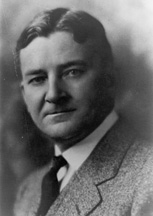Between 1920 and December 1933 there was a great reform across the United States. It wasn't quite the reform the progressive movement expected.
Today we commemorate the passage of the Blaine Act in 1933. This brief piece of legislation began a year-long process of conventions among the states to adopt an amendment to end the debacle we know as Prohibition. Granted, overindulgence in alcohol was a national issue by the Gilded Age. At the same time, I doubt few liberals would have expected the degree of lawlessness that engulfed American society as a result of their best intentions. Indeed, a year before the Blaine Act, John D. Rockefeller wrote this appraisal:
When Prohibition was introduced, I hoped that it would be widely supported by public opinion and the day would soon come when the evil effects of alcohol would be recognized. I have slowly and reluctantly come to believe that this has not been the result. Instead, drinking has generally increased; the speakeasy has replaced the saloon; a vast army of lawbreakers has appeared; many of our best citizens have openly ignored Prohibition; respect for the law has been greatly lessened; and crime has increased to a level never seen before.
And here's a photo of The Honorable John J. Blaine, U.S. Senator from Wisconsin, who was responsible for not only writing the act bearing his name but also the 21st Amendment that officially repealed Prohibition.

 |
| The New York Times front page from February 17, 1933 |
Sources
Photos and Illustrations:
The New York Times, rarenewspapers.com
Blaine, public domain photo, bioguide.congress.gov
Blaine, public domain photo, bioguide.congress.gov
Text:
Rockefeller quote, "Twenty-first amendment to the United States Constitution," wikipedia.com, reference 3, "Letter on Prohibition - see Daniel Okrent, Great Fortune: The Epic of Rockefeller Center, New York: Viking Press, 2003. (pp.246/7)."

No comments:
Post a Comment